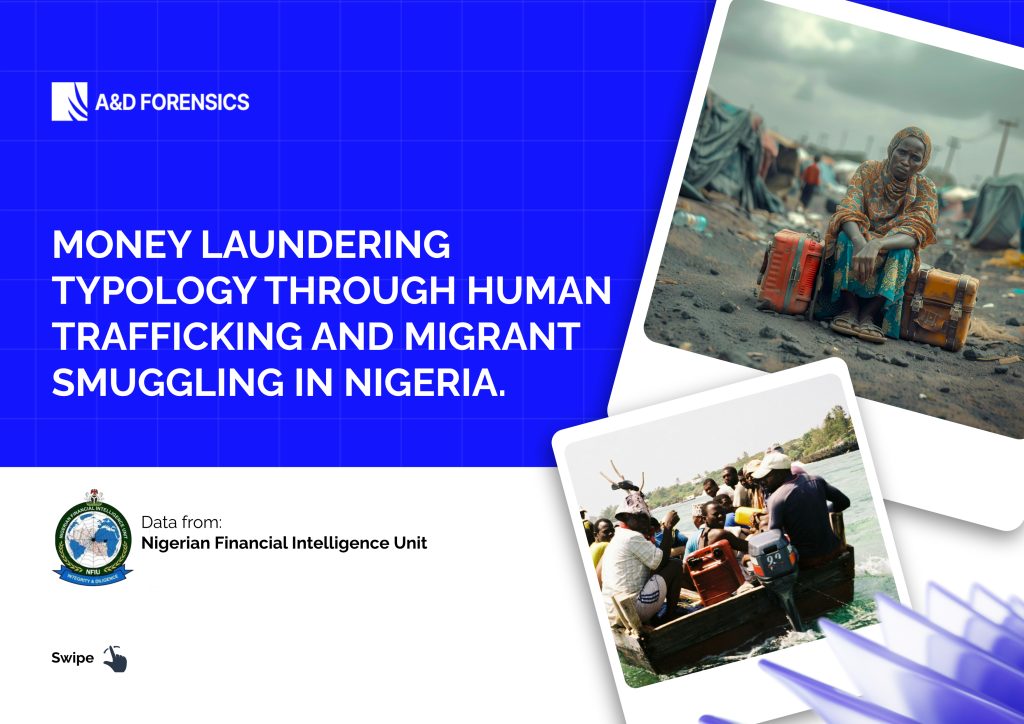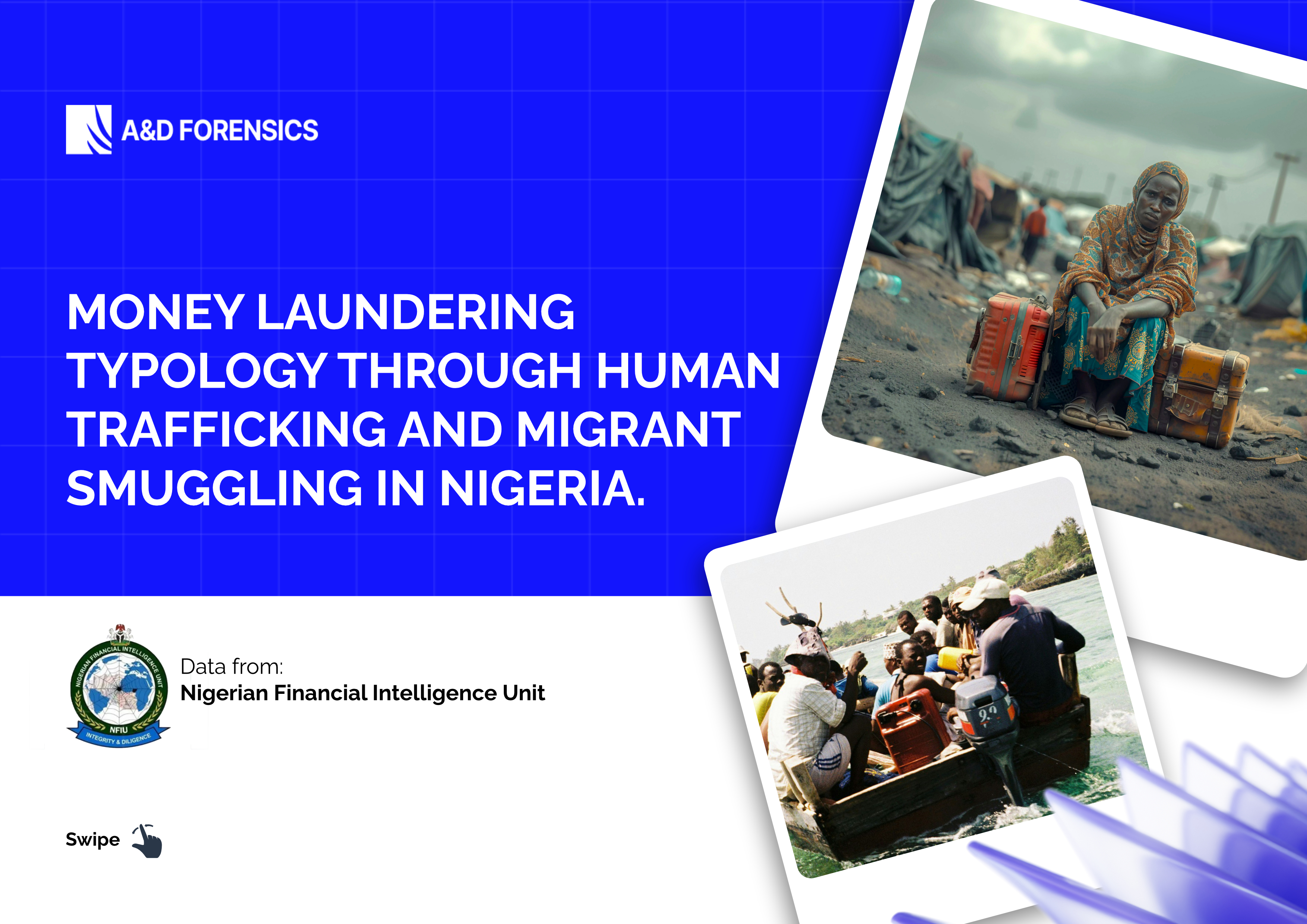Human trafficking and migrant smuggling remain critical challenges in Nigeria, with far-reaching implications for national security, human rights, and financial integrity. Human trafficking and migrant smuggling are not only exploitative but are often deeply intertwined with complex money laundering operations.
In response, the Nigerian Financial Intelligence Unit (NFIU), working in collaboration with national and international stakeholders, has released a detailed report titled “Money Laundering Typology Through Human Trafficking and Migrant Smuggling in Nigeria.”

This report examines how illicit financial flows are generated, moved, and concealed by criminal syndicates operating across borders. The report provides insights to law enforcement agencies and policymakers involved in the detection and disruption of the networks and groups perpetrating these in Human Trafficking and Migrant Smuggling in Nigeria.
Understanding Human Trafficking and Migrant Smuggling in Nigeria.
Human trafficking and migrant smuggling are two distinct but often interconnected crimes affecting Nigeria. Human trafficking involves recruiting, transporting, or harboring individuals through force, deception, or abuse of power for the purpose of exploitation such as forced labour, sexual exploitation, or organ removal. Migrant smuggling, on the other hand, entails assisting people in crossing borders illegally in exchange for financial gain, and while smuggled migrants may initially consent, they can later become victims of trafficking.
Nigeria plays a significant role as a source, transit, and destination country for Human trafficking and migrant smuggling. The 2022 National Inherent Risk Assessment reveals that criminal syndicates, including cult-like groups, operate across Nigeria and collaborate with foreign networks in Europe, the Middle East, and Asia. These groups often traffic young women using deceptive promises and force. Financially, Human trafficking and migrant smuggling generate substantial illicit profits that are laundered through informal money transfer systems, shell companies, and real estate investments.
Legal and Institutional Framework on Human Trafficking and Migrant Smuggling in Nigeria.
Nigeria has established a strong legal and institutional framework to combat human trafficking and migrant smuggling. Despite this, the country ranks high in organized crime, placing 6th globally, 2nd in Africa, Human trafficking score: 7.5 /10, Migrants smuggling score: 6.0 /10 and 1st in West Africa according to the Organized Crime Index (2021–2023).
Several important laws support Nigeria’s efforts. The Trafficking in Persons Act (2015) is the main anti-trafficking law. It criminalizes trafficking for forced labour, sexual exploitation, and organ removal. It also provides penalties, protects victims, and gives NAPTIP the authority to act. The 2019 Regulation on Organizations and Centers controls travel agents and shelters involved in recruitments, education, labour, and rehabilitation of trafficked persons.
The Immigration Act (2015) deals with migrant smuggling and gives the Nigeria Immigration Service power to investigate and stop smugglers. The Child Rights Act (2003) protects children from abuse, child labour, and trafficking. The Penal and Criminal Codes (used in northern and southern Nigeria) also punish offences like abduction, forced labour, and sexual exploitation. The Money Laundering Act (2022) criminalizes the laundering of money from trafficking, smuggling, and sexual exploitation.
These laws are enforced by agencies like NAPTIP, which investigates cases and helps victims; the Nigeria Immigration Service(NIS), which controls borders; and the EFCC, which handles financial crimes. Other agencies such as the Police, DSS, Customs, and Civil Defence Corps work together to tackle these crimes.
Geographical Location and Relationship with Human Trafficking and Migrant Smuggling in Nigeria.
Nigeria is widely recognized for its exposure to human trafficking and migrant smuggling, with 60% of respondents identifying it as a source country and 40% noting it serves as both a source and a transit or destination country. The heatmap below illustrates key states highlighted by respondents as major hotspots. Edo State, located in the southern region, was the most frequently cited for the movement of migrants smuggling and trafficking victims.

7 Money Laundering Typology Through Human Trafficking and Migrant Smuggling in Nigeria.
- Use of Cash in Laundering Proceeds of Crime: Criminals often rely on large volumes of cash to obscure the origin of illicit funds, exploiting the anonymity and limited traceability associated with cash transactions.
- Use of the Non-Financial Sector to Launder Proceeds of Crime: Non-financial sectors such as real estate, luxury goods, casinos, and professional service providers are frequently misused to disguise illicit gains and integrate them into the legitimate economy.
- Use of Formal and Informal International Money Transfer Operators: Both licensed and unregulated money transfer systems (e.g., hawala or similar informal networks) are used to move illicit funds across borders while avoiding detection by financial authorities.
- Use of Non-Profit Organisations (NPOs): Some criminals exploit the legitimacy of NPOs to channel illicit funds under the guise of charitable donations or humanitarian aid, making tracing and oversight more complex.
- Use of Migrants to Smuggle Cash: Migrants are sometimes recruited or coerced into physically transporting undeclared cash across borders, serving as couriers for proceeds of crime.
- Organised Criminal Gangs Involved in Migrant Smuggling: Transnational organised crime groups are increasingly engaged in migrant smuggling operations, often intertwining human trafficking with money laundering and other financial crimes.
- Integration of Proceeds of Crime into Real Estate: Illicit funds are frequently invested in real estate both commercial and residential as a means to legitimize criminal profits and store value, often through complex ownership structures.
10 General Red flags & indicators of Human Trafficking and Migrant Smuggling in Nigeria.
Here are key indicators of human trafficking and migrant smuggling drawn from travel, transaction, and behavioural red flags:
- A passenger claims they are travelling for a promised job in Europe or the Middle East.
- The traveller has little or no knowledge about their destination or reason for travel.
- Multiple young girls from rural areas are travelling together, directed by a more educated woman.
- The passenger holds multiple travel documents or lacks a valid passport.
- Inconsistent or false information is given about travel purpose or destination.
- Suspicious financial transactions are linked to high-risk trafficking jurisdictions.
- Frequent money transfers from unrelated senders with vague narrations like “sponsorship” or “upkeep.”
- Immediate redirection of funds received to third parties who are also under suspicion.
- A chaperone holds the passports for a group of girls, suggesting control or coercion.
- The passenger shows nervous behaviour—avoiding eye contact, fidgeting, or hesitating to speak.
10 Common Trends in Money Laundering Linked to Human Trafficking and Migrant Smuggling
Here are 10 key trends in money laundering associated with human trafficking and migrant smuggling in Nigeria:
- Use of Shell Companies: Traffickers set up fake businesses like travel agencies to disguise illegal operations and launder money through seemingly legitimate transactions.
- Preference for Cash Payments: Cash is used to avoid leaving transaction trails, making it harder for law enforcement to trace illicit funds.
- Investment in Real Estate: Illicit proceeds are used to buy properties, both to legitimize funds and provide housing for victims.
- Manipulated Invoices and Goods Valuation: Traffickers overstate or fake the value of imports/exports to justify large money transfers.
- Use of Money Mules: Vulnerable people are unknowingly used to move illicit funds, often across borders.
- Trafficking of IT-Skilled Youth: Tech-savvy young men are trafficked to scam centres in Southeast Asia and countries like Ghana to work as digital marketers, data scientists, and social media managers.
- Virtual Assets as Payment: Cryptocurrencies are used to hide the source of illicit funds. Large amounts are paid into crypto wallets and withdrawn in other countries.
- Digital Financial Platforms: Online banking and fintech apps are increasingly used to move and conceal illegal funds.
- Use of Social Media: Platforms like WhatsApp and Facebook are used for recruitment, coordination, and communication with victims.
- Cryptocurrency Laundering: Crypto is used to transfer illicit funds across borders anonymously and beyond regulatory oversight.
Targeted Sectors for Laundering Money Derived from Human Trafficking and Migrant Smuggling.
According to NFIU, both financial and non-financial sectors are frequently exploited by traffickers and smugglers to launder illicit funds.
1. Financial Sector: These institutions and platforms are often used to move, convert, or conceal proceeds of crime:
- Banks
- International money transfer services
- Informal transfer systems like Hawala
- Digital payment systems
- Virtual asset platforms (e.g., cryptocurrency)
- Currency exchange businesses
2. Designated Non-Financial Businesses and Professions (DNFBPs): These sectors provide services or channels through which traffickers can integrate illegal earnings:
- Fashion outlets and Supermarkets
- Travel agencies
- Car dealerships
- Real estate
- Maritime and shipping services
- Hospitality and entertainment industries
- Non-profit organizations and Mining operations
- Online businesses using social media platforms and Laundry services
7 Key Efforts by Nigeria in Combating Human Trafficking and Migrant Smuggling.
- Stronger Legislation: Nigeria has adopted several laws to combat human trafficking and protect vulnerable people, including the Trafficking in Persons Act (2015), Immigration Act (2015), and the Child Rights Act (2003). These laws empower agencies and ensure the protection of children nationwide.
- Common Investigative Database (CID): Launched in December 2023, the CID is a shared platform for law enforcement agencies like NAPTIP, Immigration, and the Police to exchange intelligence and improve coordination in investigating human trafficking and migrant smuggling cases.
- Victim Support and Rehabilitation: NAPTIP provides victims with counselling, vocational training (e.g. tailoring, catering), shelter, and education. This support helps them heal from trauma and reintegrate into society.
- Awareness Campaigns: The government, with support from UNODC and Canada, released a documentary titled “Know Before You Go” to educate the public, especially youth on the risks of irregular human trafficking and migrant smuggling.
- Domestic and International Collaboration: Nigeria works with local, regional (e.g. ECOWAS), and international bodies to share information, investigate financial flows, intercept migrant smuggling attempts, and build capacity through training and legal reforms.
- Training and Resources: Law enforcement officials receive specialized training on tracking money laundering linked to human trafficking. They also use forensic labs and have professionals trained in investigation and financial crimes.
- Investigation and Border Control: Authorities conduct financial investigations, monitor hotspots, gather intelligence through informants, and verify travel documents at borders. Automated systems now help improve surveillance and detection at checkpoints.
How A&D Forensics Can Support Nigeria’s Fight Against Money Laundering from Human Trafficking and Migrant Smuggling.
A&D Forensics can strengthen Nigeria’s anti-money laundering efforts by providing advanced blockchain forensics, crypto transaction tracing, and training for law enforcement agencies fighting against Human trafficking and migrant smuggling . Our expertise enables the detection of emerging hidden financial flows linked to trafficking networks, ensuring improved identification, investigation, and disruption of illicit funds across both traditional channels and the growing use of digital financial platforms and digital assets in human trafficking and migrant smuggling.
Conclusion
Despite various efforts by the Nigerian government, combating human trafficking and migrant smuggling remains a major challenge due to the global nature of these crimes. Financial flows play a key role in enabling these networks, making it essential to disrupt them. This typology report highlights the evolving tactics used by criminals often tied to other crimes and emerging technologies, underscoring the need for continuous training and awareness. Law enforcement and reporting entities must understand these operations, identify key indicators, and take proactive steps to detect and report suspicious activities.




